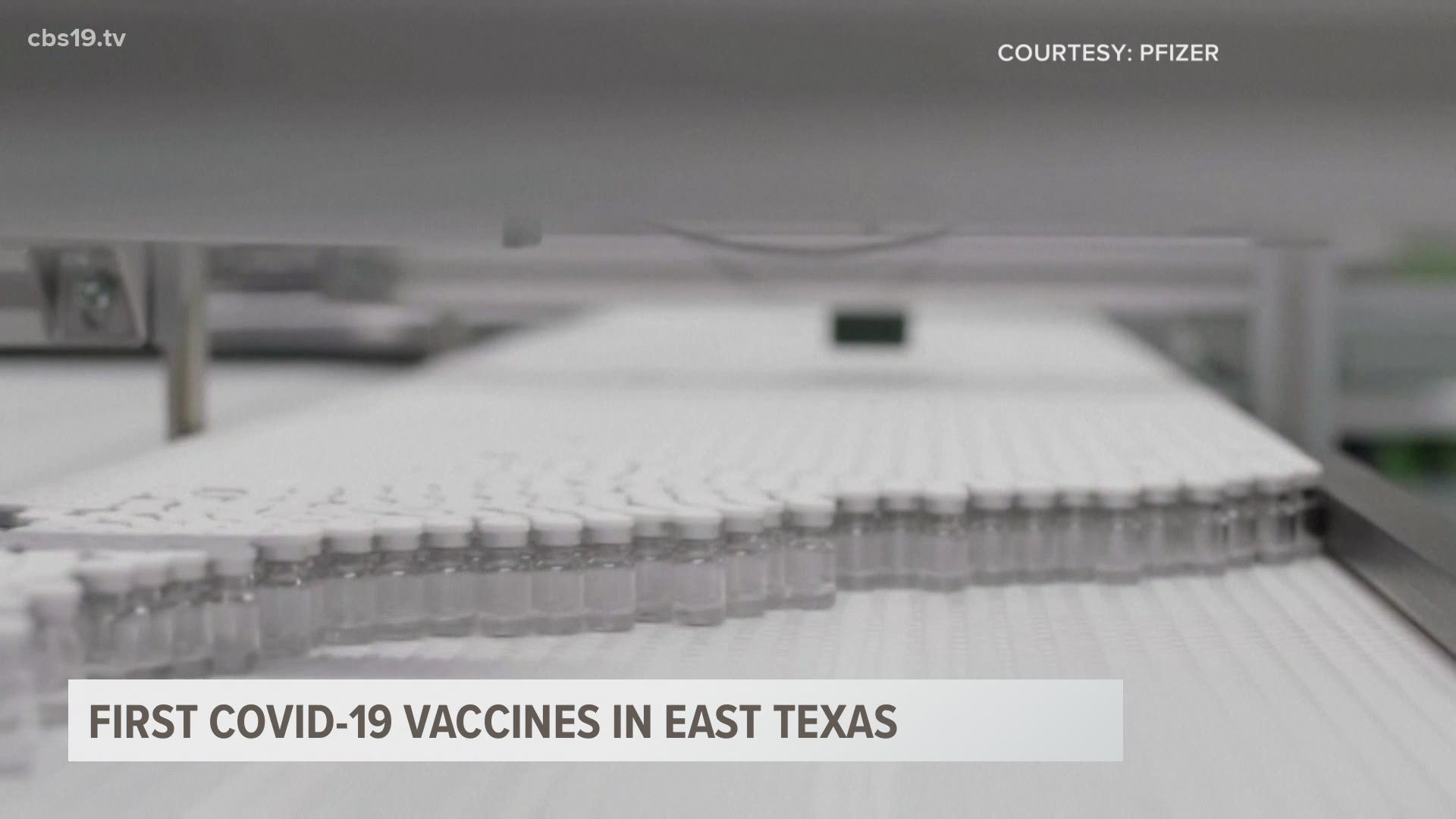TYLER, Texas — Pfizer’s COVID-19 vaccine is the first step toward potentially eradicating the coronavirus and ending the current pandemic, and it is now available in East Texas.
A small group of health care workers in the UT Health system volunteered to be the first in the area to receive the vaccine and took their shots Tuesday afternoon.
“I feel that, as a frontline healthcare worker, it is our duty to step up and take the vaccine,” Gary Viljoen, the first person in East Texas to receive the vaccine, said. “To demonstrate to the general public that it is safe to do so not only to protect yourself but also to protect our community.”
Viljoen, the director of rehabilitation services for UT Health Science Center, was one of 20 staff members who got the injection Tuesday afternoon. Hospital officials wanted a small group to pass through on Tuesday, to make sure everything worked as it should before inoculating the rest of the staff beginning Wednesday.
Dr. Richard Yates, an infectious disease specialist, was another in the first group to receive a vaccine shot. “Excited,” he said afterward. “Been looking forward to this for a couple months now, so it’s a great privilege and opportunity for us.”
A box containing 3,900 doses of the vaccine arrived earlier Tuesday morning, and was quickly taken to the pharmacy room containing a new freezer capable of maintaining the -80 degrees Celsius required by Pfizer.
“I’ve never had this much attention on any kind of delivery I have ever had,” Melissa Maeker, director of the pharmacy for UT Health East Texas’s north campus, said.
But rarely has a box contained something as unique and anticipated as Pfizer’s COVID-19 vaccine.
“The technology is amazing,” Dr. Yates explained. “The mRNA vaccine, which is a new technology for vaccines. They can make a lot of quantity of a very specific, high quality, so it’s a very exciting medical technology.”
Shonna Hansen, an infection prevention manager for UT Health Science Center, was another of the first vaccine recipients. She said she and Dr. Yates had long spoken about wanting to be at the front of the line so they could better protect their patients and set an example for those hesitant to take the vaccine.
“And so excited to see so many other faces, so many people coming forward, saying, ‘I want to be first. I want to come up there. I want to be in that first round,’” she said.
Viljoen said he frequently works with COVID-19 patients in their recovery from infection and said he has never seen anything like COVID-19 during his 20 years in medicine. “I am hoping this is the light at the end of the tunnel,” he said. “I am confident this is the light at the end of the tunnel. But, once again, we have to encourage everybody to get the vaccine.”
Each of the vaccine recipients who spoke with CBS19 said the process of getting the vaccine went well and should not scare off anyone who usually feels discomfort from shots.
“I could barely feel the shot,” Dr. Yates said. “Literally. Easier than the flu shot.”
“I’ve been a nurse for a really long time,” Hansen said. “And I’ve had a lot of inoculations, but this did not hurt at all. It didn’t. I mean, it’s not very much medicine, it didn’t hurt, my arm’s not sore. It was way better than a flu shot.”
Hansen said she looked forward to getting her vaccine, and now looks forward to seeing more and more people in East Texas get it in the months to come. “Happy, excited, elated, relieved, hopeful for tomorrow,” she said. “Because we need hope. This entire country needs hope right now.”
RELATED: HOPE: UT Health Science Center at Tyler receives East Texas' first batch of COVID-19 vaccines
Staff members from UT Health locations across East Texas will go to the UT Health Science Center on Highway 271 to receive their shot. Hospital officials decided it would be easier to use one central location based on the storage requirements for Pfizer’s vaccine. Approximately 300 people will be able to sign up on a given day.
The shipment of vials is meant for initial doses of the vaccine. Each person needs two shots of Pfizer’s vaccine, roughly three weeks apart. Texas Department of State Health officials are tracking the number of vaccines used by each hospital around the state each day, and when a facility runs low, it will deliver more shipments so the frontline workers can receive their follow-up dose.

